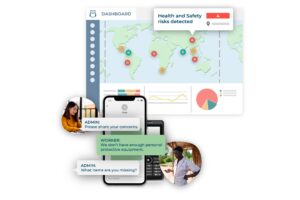In 2021 the ILO stated that there were around 169 million migrant workers globally. Migrant workers are particularly vulnerable to exploitation. In the decade leading up to the ILO statement, it was reported that around 6,500 migrant workers died in Qatar during the construction of stadiums and other infrastructure for its World Cup bid.

Source: United Nations

6,500 migrant workers died in Qatar during its World Cup bid.
An investigation by the Business and Human Rights Resource Centre (BHRRC) covering 1 December 2022 to 30 November 2023 linked 613 cases of migrant abuse to 389 companies. At least 96 migrant workers died due to alleged corporate neglect and inadequate health and safety standards. With governments and companies being held to account for migrant worker exploitation, the need for collective action is becoming clearer.

Source: BHRRC
Regulations Calling for Effective Tools are Growing, but Remain Patchwork
There is a trend towards stronger regulations against companies associated with worker exploitation. The EU has introduced two laws, the Corporate Sustainability Reporting Directive (CSRD) and the Corporate Sustainability Due Diligence Directive (CS3D), to induce companies operating in the EU to establish and report on processes to identify, assess and mitigate exploitation, and mandates for accessible due diligence practices, such as grievance procedures. Germany’s BAFA rules place obligations on companies to promote appropriate, accessible and effective policies, including a well functioning grievance process, and to report on their progress. Such tools are essential for ensuring migrant workers are supported with a system of well-functioning safeguards.
But action is not exclusive to Europe. The government of Malaysia, for example, is clamping down on migrant worker exploitation, issuing fines to 272 companies amounting to just over $460,000. The US has banned the import of certain goods on the basis of labor exploitation issues in the supply chain.
While these efforts are welcome, migrant workers face specific challenges that require a more holistic global effort with tools tailored to their transnational circumstances.
Migrant Worker Exploitation is Ubiquitous and Requires a Global Response
Migrant worker exploitation is multi-faceted, and occurs at every stage of employment, from recruitment to onward migration. The International Organization for Migration (IOM) lists the most common forms of exploitation that migrant workers face here.

Migrant worker exploitation occurs at every stage of employment
The IOM identifies recruitment by unlicensed subagents, recruitment fees and visa issues as risks that could lead to exploitation. The precarious nature of migrant worker residency often puts them at greater risk. From 2018 to 2023 the Australian Migrant Justice Centre surveyed 15,000 migrant workers. Failure to pay the minimum wage was prevalent in three quarters of cases, but nine out of ten of these workers did not report exploitation out of fear of jeopardizing their visa process. Some migrant visa sponsorships depend on exploitable work, allowing unscrupulous employers to use visas as a threat.
Unscrupulous employers undermine the migrant worker’s self-determination by withholding visas and forcing them to pay extortionate recruitment fees. The Global Fund to End Modern Slavery (GFEMS), Ulula, Verité, and the Fair Hiring Initiative carried out a case study on migrant workers in the Vietnam-Taiwan corridor and found that workers who had to borrow money to pay recruitment fees would be paying off their debts for 7-24 months.
The GFEMS case study and the prevalence of unethical recruitment practices highlight the need for worker voice technology in the supply chain. When workers are able to speak for themselves, the revelations can be shocking, but they enable more effective collaborative efforts by identifying where stakeholders can make the most impact.
The IOM also identifies discrimination, harassment and violence as common challenges during employment. In Spain’s Huelva and Almería regions, a report from Ethical Trade found evidence of forced labor, sexual assault and intimidation among migrant worker communities.
Multi-stakeholder efforts like Appelando and the Ethical Trade Forum are aiming to amplify worker voices through technology in Spain and further afield. The Ethical Trade Forum promotes better working environments in Spain’s agri-food industry, much of it in areas like Huelva and Almería. Ulula provides the tech that enables their Canal Foros grievance mechanism to receive complaints from migrant workers and connect them with the relevant stakeholders. For Appelando, of which Ulula is a member, the goal is to create a holistic global effort to improve working conditions through harmonized access to grievance mechanisms and remediation.
Globe-girdling collective efforts like these will be especially beneficial for workers whose circumstances could force them to move between different jurisdictions with uneven levels of protection.
Digital Worker Feedback Tools Make Global Grievance Mechanisms Viable
The IOM recommends actions that emphasize participation and accessibility. Crucially, they call for workers and their representatives to be engaged thoroughly in the design and implementation of engagement processes and grievance mechanisms, and that companies proactively identify and address potential issues with a risk-based approach.
If companies are expected to take action in the supply chain, as is required by the current wave of regulations and international standards, they need scalable digital tools.

Ulula surveys are designed to identify migrant worker exploitation risks
Ulula surveys are designed to identify migrant worker exploitation risks by enabling workers to highlight risks anonymously, in any language and on any device. They’re aligned with global standards and indicators to support compliance and reporting needs, but are also customizable, allowing companies to demonstrate actions, and evidence their impacts in a way that works for them.
Mobile phones allow migrant workers to to contact family and friends, and enable them to get by in their new surroundings by learning the language, local customs, and more. Digital feedback mechanisms that work on migrants’ devices can be an effective tool to support workers’ migration journey through recruitment, placement, employment and onward migration. Where mobile phones are not the best option, QR codes and offline voice lines can be deployed.
In collaboration with local partners, digital worker feedback tools can raise awareness of rights and means of redress among migrant worker communities, and allow them to raise concerns anonymously, enabling companies to get ahead of risks in their supply chain. They lay the groundwork for stakeholder initiatives where the identification and mitigation of migrant worker exploitation is built into the system, generating far-reaching benefits for migrant workers.
Companies that embrace digital tools early will set the standard for supply chains where migrants can work in safety and security. Get started today.

